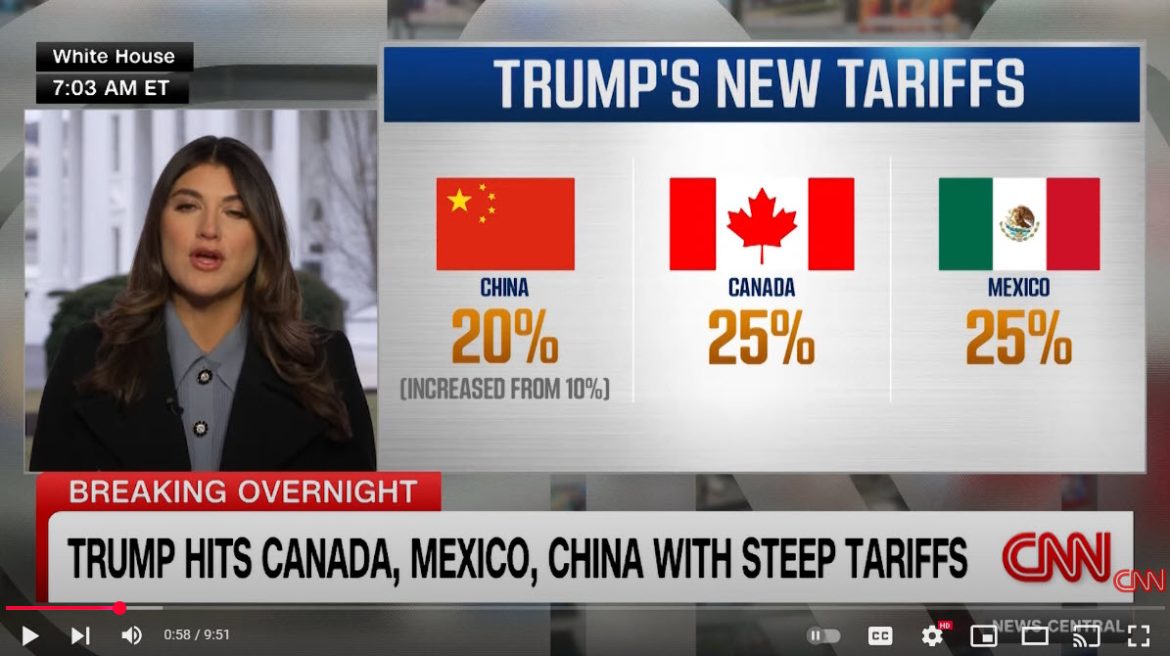President Donald Trump’s new tariffs on imported goods from Mexico and Canada are now in effect, setting off a wave of retaliatory measures from America’s key trading partners. The 25% tariffs on a wide range of goods, combined with an additional 10% tariff on Chinese imports, mark one of the most aggressive trade policies enacted by the Trump administration. Beijing has responded by imposing its own retaliatory tariffs on U.S. agricultural products, while Canada and Mexico are also rolling out tariffs targeting American exports.
Economists warn that the new tariffs could drive up costs for American consumers, as importers pass the increased costs along to retail prices. Shoppers are already seeing the effects in grocery stores, particularly on produce imported from Mexico. Target CEO Brian Cornell cautions that prices for fruits and vegetables such as avocados, bananas, and strawberries could rise as early as this week. Retailers across the U.S. are bracing for similar price hikes on other consumer goods.
Iowa Senator Chuck Grassley acknowledges the potential impact on key industries, particularly pork production in his home state. He expects Canada and Mexico to retaliate by targeting U.S. agricultural exports, which could disrupt trade relationships critical to farmers. With Mexico being the largest importer of U.S. pork, producers in Iowa and other agricultural states are bracing for potential losses if Mexican buyers turn to alternative markets.
The tariffs are part of Trump’s broader economic strategy aimed at pressuring trading partners to negotiate better deals for the U.S. However, the move comes at a time when inflation remains a significant concern for American consumers. Higher tariffs could exacerbate price increases, particularly for food and automobiles. Industry experts predict that new car prices could rise significantly due to increased costs on imported components.
Mexico and Canada’s retaliatory tariffs target a broad spectrum of U.S. goods, including agricultural products, dairy, and manufactured items. China’s countermeasures focus on American food and agricultural products, directly impacting farmers who rely on exports to the Asian market. These retaliatory actions raise concerns that the escalating trade war could weaken the North American economy, particularly as businesses and consumers absorb the impact of higher prices.
As tensions rise, business leaders and lawmakers are calling for negotiations to prevent further economic damage. The Biden administration’s trade policies previously focused on stabilizing relationships with key allies, but Trump’s tariffs mark a return to more aggressive tactics. It remains uncertain whether the new measures will lead to renegotiated trade agreements or prolonged economic strain.
Consumers, farmers, and businesses across the country are closely monitoring the impact of the tariffs, while global markets react to the shifting trade landscape. With inflation concerns already pressing, the coming weeks will determine how these tariffs affect prices, jobs, and economic growth across multiple industries.
Source Links:
- YouTube: China and Canada Immediately Retaliate Against Trump’s Tariffs
- YouTube: US Tariffs Take Effect and Mexico, Canada, and China Retaliate



